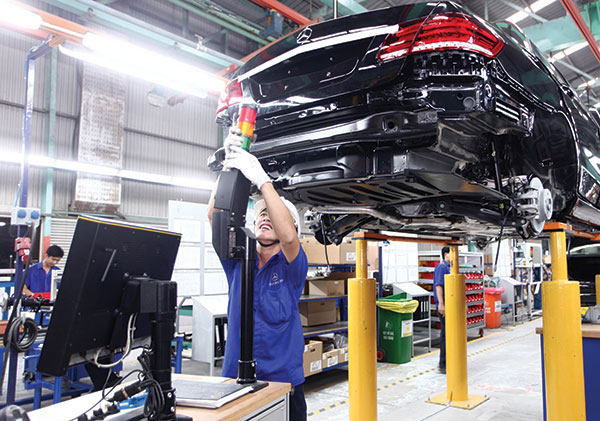JICA
upbeat over Vietnam prospects
Vietnam saw its economy rebound in
2016, leaving a brighter outlook for 2017. Yamamoto Kenichi, deputy chief
representative of Japan International Cooperation Agency’s (JICA) Vietnam
Office, spoke with VIR’s Thanh Tung about his office’s expectations for the
local economy in the time to come.
What is JICA’s expectation for
Vietnam’s economic prospects for 2017?
Before
talking about the prospect, let me recall some significant challenges and
achievements of Vietnam in 2016 as I believe they will pave the way for
performance in 2017. In the first half of 2016, the economy experienced
negative growth in the agriculture sector, due to severe drought and salinity
intrusion.
But
the sector performance gradually improved in the later half. This suggests
its potential to further contribute to Vietnam’s economic growth, if
agriculture restructuring is properly implemented.
In
the context of sluggish global trade, Vietnam achieved an 8.6 per cent
growth rate in export value in 2016. The actual economic growth rate in 2016
was 6.21 per cent, lower than the National Assembly’s targeted 6.7 per cent
and the government’s expectation of 6.3-6.5 per cent. However, given the
difficulties and challenges mentioned above, it is highly appreciated.
I
believe in a brighter picture for the economy next year, with a higher
economic growth rate.
What challenges do you see waiting
for Vietnam in 2017?
Many
challenges remain for Vietnam to weather. For example, I have not seen
significant actions in the progress for non-performing loan resolution and
state-owned enterprise (SOE) reform.
If
these matters are not resolved, they may become obstacles for Vietnam to get
back to the high economic growth trajectory experienced in the period before
the global financial crisis.
Given
the expected increasing volatilities in the global economy in 2017, only
restructuring efforts will help strengthen the economy from its inside to
better cope with external headwinds and seize the opportunities for high and
sustainable growth.
What are your policy recommendations
for the government?
From
my point of view, the future holds challenges for the nation to overcome in
addition to the advantages it will bring.
This
is especially true in Vietnam’s adaptation to conditions of the ASEAN
Economic Community, and of the several free trade agreements coming into
force.
One
of the most important policy questions is how to improve the country’s
investment and business climate in order to increase investment from domestic
private sectors.
In
this context, the Vietnamese government is suggested to carry out policies
that promote the investment climate of business through the restructuring of
key sectors, including SOEs, the banking system, and logistics systems – in
such a case as fully and efficiently utilising the port system around Ho Chi
Minh City.
The
international competitiveness of Vietnam could be enhanced more strongly when
the government pays more focus to facilitating finance to small- and
medium-sized enterprises (SMEs) who are working in supporting industries.
Also,
developing a favourable financial mechanism for farmers and/or agricultural
enterprises that have concrete and feasible business plans in the agricultural
sector could be very important in helping increase the value of agricultural
products. This is considered a key factor for improving the competitiveness
of Vietnam’s agriculture in the future.
VIR
|
Thứ Tư, 18 tháng 1, 2017
Đăng ký:
Đăng Nhận xét (Atom)


Không có nhận xét nào:
Đăng nhận xét